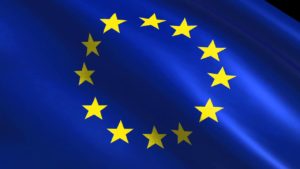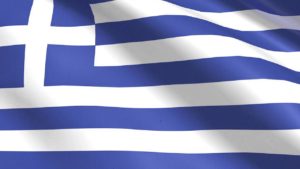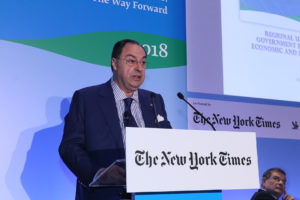


ATHENS: Offshore gas from the Eastern Mediterranean could usher in a new era of energy independence and economic renaissance for Europe, a regional energy expert told a high-profile industry conference in Athens on Friday.
“Almost instantly, the flow of East Med gas into Europe would mean additional diversification and flexibility of supply, closely followed by enhanced competitiveness for European industry, accelerated economic growth, and dramatic long-term improvements for public finances,” Roudi Baroudi, a veteran of more than 36 years in the oil and gas business, told the Athens Energy Conference.
While “East Med gas would be more of a complement than a competitor to supplies already flowing … from Russia” and other countries, he explained, other factors were also likely to help Europe diversify its energy supply, putting downward pressure on prices and “reducing the potential impact of possible interruptions elsewhere”.
Baroudi, who currently serves as CEO of Energy and Environment Holding, a Doha-based independent consultancy, has advised governments, companies, and multilateral institutions on energy matters, even helping to craft policy for agencies of the European Union and the United Nations. Speaking on the sidelines of the conference, which drew a broad audience including senior figures from both the public and private sectors, he said the timing “could not be better” for Europe.
“Shale gas has made America another energy superpower alongside Russia and OPEC, and liquefied natural gas is now a fully fledged global commodity,” he said. “Plus, the East Med producers will be sitting on Europe’s doorstep, and several countries are already gearing up to start taking massive LNG shipments. Decades of benefits for hundreds of millions of people, all there for the taking.”
And expected producer countries like Cyprus, Greece, and Lebanon, Baroudi added, stand to gain even more. “For a variety of historical reasons, most of these countries have not yet achieved the levels of development enjoyed in most of the European Union,” he told the conference. “Given the potential rewards for their peoples, the governments involved have nothing less than a moral responsibility to take advantage of propitious circumstances by tapping the oil and gas wealth within their respective social, economic, and geopolitical reaches.” Baroudi also has emphasized some of East Med countries are not party to UNCLOS but all countries are signatories to the UN Charter. Therefore, Baroudi reminded that all these countries are under an obligation to “settle their international disputes by peaceful means in such a manner that international peace and security, and justice, are not endangered.”
He also sounded notes of caution, however. For one thing, he stressed the need for producer countries to ensure proper management of the proceeds from gas sales to pay social justice. For another, he reinstated on the same countries to avoid international tensions that might impede development of the sector.





